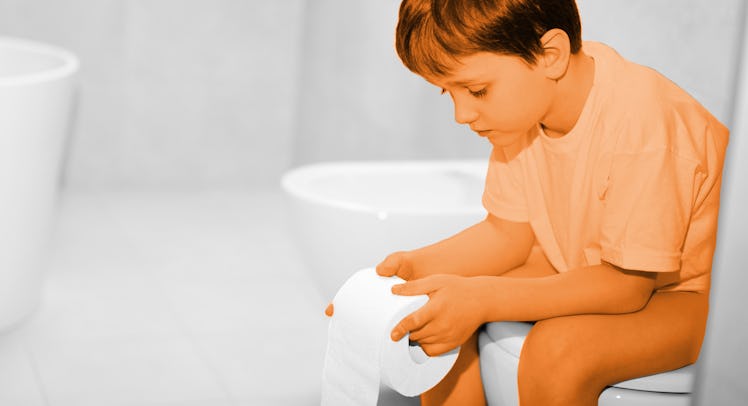How to Help a Kid Poop Faster and Fight Constipation
Putting pressure on slow pooper doesn't help. There are other strategies that do.

Constipated children can easily find themselves in toileting trouble. And there are dozens of reasons kids could get stopped-up. In lieu of pooping fast, some kids figure it’s just easier just to hold it in. There are the children that might have started potty training too early and are unable to recognize bodily sensations of urgency. Some may simply not feel secure enough and prefer to go at home. Others may have exceptionally high privacy demands. Whatever the reason, parents need to get things moving again.
“It can become a cycle as kids get backed up and then it may be harder to go,” says Dr. Alison Mitzner, a board-certified pediatrician. “If it hurt and they had pain with a prior bowel movement, the child may fear the pain again and start holding it in.”
READ MORE: The Fatherly Guide to Poop, Diapers, and Potty Training
Constipation doesn’t only affect toilet habits – it can affect appetite, hydration, and even lead to bedwetting. But there are some simple things parents can do to help get their kids regular.
“I would recommend dietary changes – it works great,” says Mitzner. “Add fiber to their diet and ensure your child drinks plenty of water. Prune juice diluted with water works great for constipation, too.”
Simply helping a child relax can ease discomfort and help them move their bowels, too. Warm baths can be pretty effective at helping kids relax a bit too much. That might be frustrating for parents when they don’t expect it, but it can be a boon for kids who need to go. Scheduling good times for kids to try to go can be surprisingly effective, as long as parents aren’t pushy and overbearing.
How to Help a Kid Poop Faster
- Diet and Hydration – Adding fiber to kids’ diets can do wonders. Prune juice is effective to prompt bowel movements, and drinking lots of water not only helps kids get regular, but stay regular.
- Relaxation – When kids can relax, it’s easier to poop. A warm bath can help.
- Scheduling – Thanks to the gastrocolic reflex, the body tends to poop after meals. That’s the perfect chance to try sitting on the toilet.
- See a Pediatrician – If constipation persists, the next step is consulting with a pediatrician – NOT over-the-counter treatments.
- Being Cool – Using the potty should be low stress. Parents should let kids take their time. They’ll eventually get better at it.
“You can sit your child on the potty after a meal,” suggests Mitzner. “There is a gastrocolic reflex in which the body has a natural tendency to have a bowel movement after a meal.”
These are fairly gentle ways to help kids move their bowels, much more so than the over-the-counter solutions adults rely on – which parents shouldn’t try on their own. “If constipation is still a concern, always be sure to contact your pediatrician for a further evaluation,” advises Mitzner. “I wouldn’t recommend over-the-counter medications for children unless you are directed by your pediatrician.”
Once a child is no longer constipated, some of the very things that helped them get regular can help them stay regular – fiber, water, relaxing and regularly scheduling good times will all help. But one of the easiest ways to help kids develop regular toilet habits is the simplest: be cool.
“Do not pressure your child if he or she does not want to go on the potty,” says Mitzner. “Give lots of positive reinforcement. Even if they don’t have to go when they get to the bathroom, you can stay there for a few minutes. Praise them for the great effort. Remind your child that they can go again later.”
Kids who take their time on the potty can be frustrating, but making them self-conscious about it won’t help. Letting them take a little time to figure out what is going on and gain the confidence in their toilet habits will be better for everyone in the long run, even if it cuts into dad’s alone time.
This article was originally published on